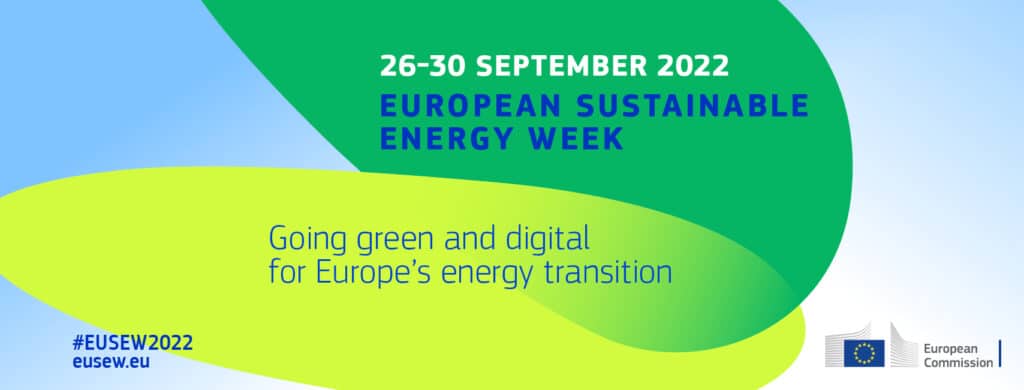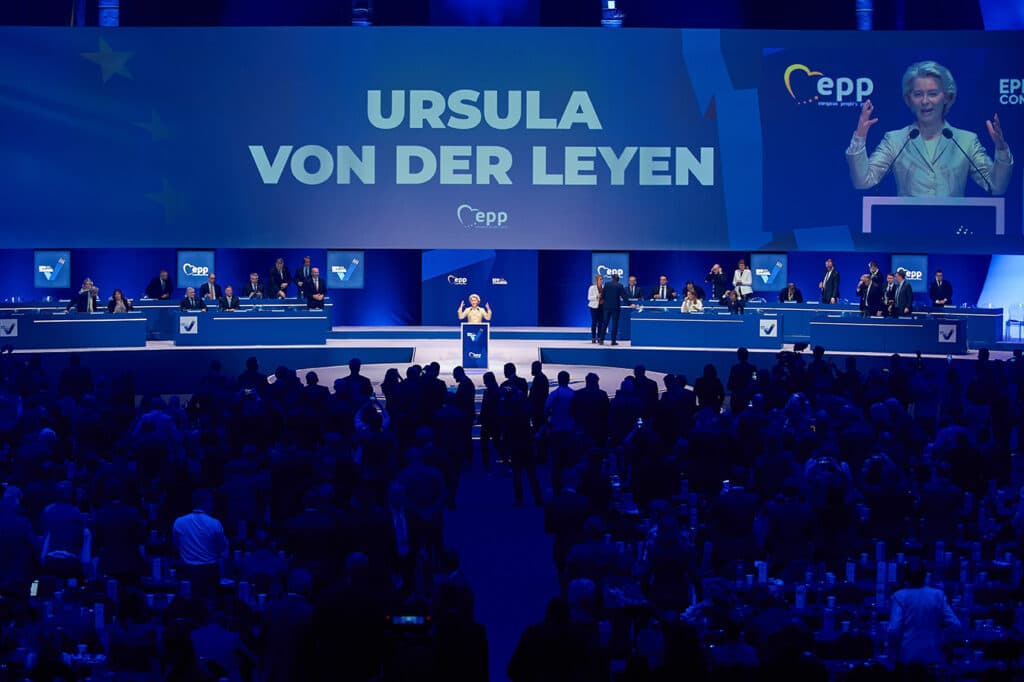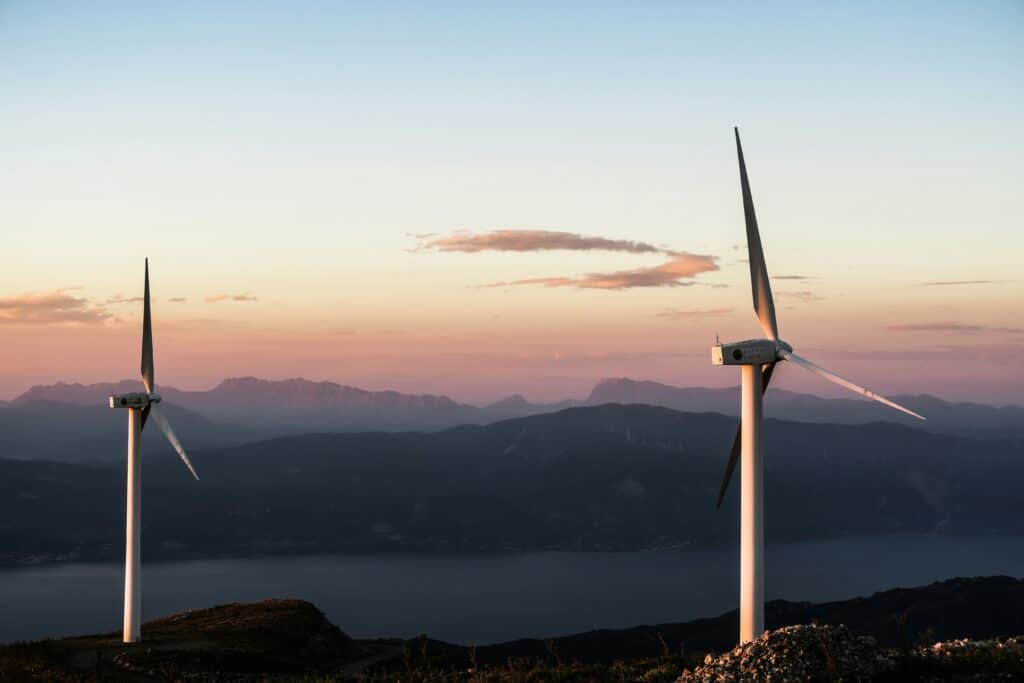EUSEW 2022 – Live updates
This year's European Sustainable Energy Week (EUSEW) is held between 26-30 September 2022. Follow the FSR's live coverage of the conference.
The European Sustainable Energy Week (EUSEW) is an annual conference organised by the European Climate, Infrastructure and Environment Executive Agency (CINEA), in close cooperation with Directorate-General for Energy. The 2022 edition of the conference will take place in hybrid form, from Brussels, from 26 to 30 September.
It will bring together public authorities, private companies, NGOs and consumers to promote initiatives to go green and digital for Europe’s energy transition.
The main topics of discussion will be REPowerEU, the digitalisation and integration of energy systems, energy efficiency, renewables, consumers and a fair energy transition, decarbonisation policies and international cooperation. The FSR will participate in three sessions, with its academic staff acting as speakers and moderators.
The full schedule of our FSR panels:
- Repowering Europe by empowering energy communities: a perspective on digital and social innovation | Tuesday 27 Sep 2022 2:30-4 PM CEST
with FSR Director Leonardo Meeus
#DigitalTransformation #Resilience #EnergyCooperation - Data exchange and governance models for energy data hubs | Tuesday 27 Sep 2022 4:30 – 6 PM CEST
With FSR Research Associate Valerie Reif (moderator)
#Digitalization #DataHub #Flexibility - The potential of renewable gases to support the energy transition and guarantee security of supply | Thursday 29 Sep 2022 @ 2-3:30 PM CEST
with FSR Research Associate James Kneebone
#Decarbonisation #RenewableGases
On this page, you will find the latest news and tweets from the conference, exclusive interviews with the speakers, and highlights from the sessions. Keep up to date with the hottest topic in the energy sector, as discussed at the #EUSEW2022, by scrolling through FSR LIVE updates.
The full programme of the Policy Conference can be found here and the link to register here.
Pyrolysis of waste and biomass for clean energy and circular economies
FSR Research Associate James Kneebone interviews Paul Préaux, Co-Founder of BioFlux
In this short interview, James Kneebone of the Florence School of Regulation is joined by co-founder of Bioflux, Paul Préaux, to discuss innovation in the drive to decarbonise the EU energy and waste systems. Paul gives an overview of his work with biomass pyrolysis and how this technology is being applied to valorise waste streams for the production of energy, heat, and useful biochar. The pair explore some of the challenges for innovation in this space, where best practices are already being shared, and how the prevailing energy trilemma (security, sustainability, and price) has created a fresh imperative for policy to be more dynamic and to move quickly.
The potential of renewable gases to support the energy transition and guarantee security of supply
Moderator: Elizabeth Press, Director of Planning and Programme Support, International Renewable Energy Agency (IRENA)
Speakers:
– Valeriya Izhyk, Working Group Coordinator, Council of European Energy Regulators (CEER) and Senior Energy Expert, Ecoaction
– Catherine Banet, Research Fellow, Centre on Regulation in Europe (CERRE), Professor at University of Oslo
– Ana Rita Gomes, Energy Policy Analyst at Apetro and Board Member at Future Energy Leaders (FEL) Portugal
– James Kneebone, Research Associate at the Florence School of Regulation (FSR)
– Giulia Cancian, Secretary General, European Biogas Association (EBA)
– Jaap Peterse, Energy Consultant, Guidehouse, and Gas for Climate
– Ilkka Hannula, Senior Energy Analyst, International Energy Agency (IEA)
Highlights of the session by FSR Research Associate James Kneebone
Secure, sustainable, cost-effective, and… moral?
As part of the policy conference programme of the European Union Sustainable Energy Week (#EUSEW2022), this session looked at how policy should contribute to the development of renewable gases (principally biogas and renewable hydrogen) in the EU and beyond.
The context for focusing on renewable gases is a confluence of EU policy objectives, bridging the energy trilemma of (i) security, (ii) competitiveness, and (iii) sustainability, as well as a moral imperative, to divorce from Russian fossil fuels following the Russian invasion of Ukraine earlier this year. Against the background of the Hydrogen and Decarbonised Gas Package (HDGMP) and the REPowerEU Plan, the session highlighted different models and use cases at the European and national levels, looking at accelerating the deployment of renewable gases.
The global perspective
Elizabeth Press (IRENA) opened the session with a presentation on the geopolitical implications and patterns of development for renewable gas potential globally. She reflected on the emerging trade lines, as well as how infrastructure matches up with supply and demand lines. She suggested that whilst most of the infrastructure for imports, transmission, and end-use is in the global north, most of the potential for production is in the global south.
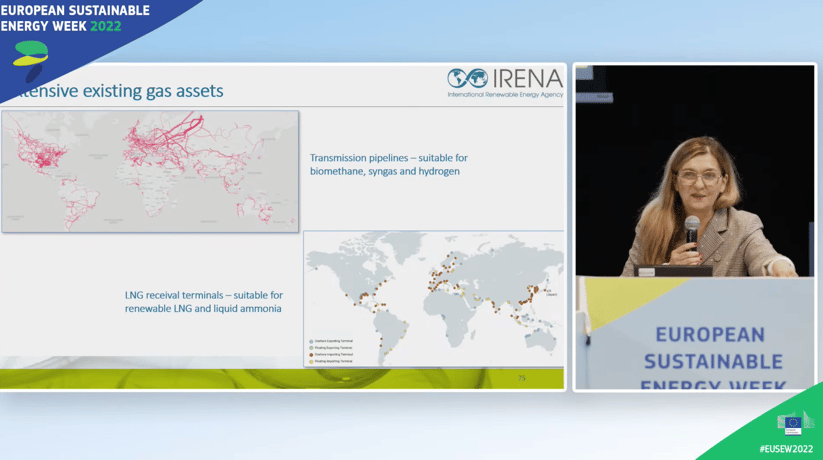
Ms. Press then went onto welcome Dr Ilkka Hannula of the IEA to the floor for his keynote intervention. He spoke about the expectation for renewable gas use to grow six-fold by 2050 to keep pace with the IEA’s Net-Zero Emissions (NZE) scenario. Unfortunately, the prevailing uptake level is not quick enough to realise the corresponding political and strategic ambition, particularly as regards Europe. For context, he suggested that the REPowerEU target of 10 million tonnes of imported hydrogen by 2030 could be met based on the existing projects announced to date, but that this would represent almost all the anticipated traded flows globally by that date.
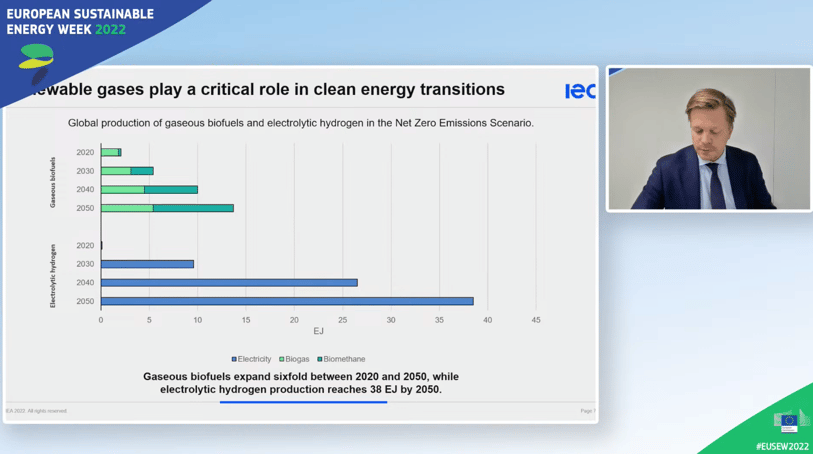
What a transition from fossil gas to renewable gas could mean for security of supply?
James Kneebone (FSR) highlighted in his opening intervention three important ways he felt that the transition to a renewable gas system would likely have an impact on security of supply. Firstly, Mr. Kneebone argued that there is a fundamental difference in market participation on the supply side due to the different ways these gases are produced. Whilst fossil gas suppliers are limited to those endowed with resources on their territory and as such the market is highly concentrated, renewable gas production is likely to be a fragmented and decentralised market with a high level of market accessibility due to widely available renewable inputs (biomass, wind, solar, hydro power).
Secondly, he made the point that the EU imports ~75% of its gas via pipeline, which is an inflexible form of infrastructure that creates (co)dependency. Moving forward, the EU is working towards importing more and more of its energy via ship, a system of transmission that can be adjusted to accommodate deliveries from anywhere. Mr. Kneebone argued that this was a necessary precondition to accessing a diversified portfolio of producers and ensuring that the transmission of gases was no longer such a strong tool for geopolitical leverage. Finally, he caveated this optimistic outlook by highlighting the risk of emerging dependencies on critical raw materials and manufacturing but cautioned that these would unlikely be as acute or as enduring as an energy commodity dependency.
Markets, biomethane, Ukraine, flexibility, sector coupling…
Dr. Catherine Banet (CERRE) followed up with an outline of some of the short-term priorities for regulating the market, particularly from the grid perspective. She covered the areas of dynamic regulation and core regulatory principles, as well as the importance of choosing whether or not we want one market for renewable gases or multiple.
Jaap Peters (Guidehouse) focused on the challenges of a renewable gas economy as regards flexibility and interaction with the electricity sector. He argued that the needs will vary across Member States, and that the current policy outlook at the European level is very ‘outcome focused’ and could rather benefit from more detailed reflections on the operational requirements.
Valeriya Izhyk (CEER) gave the Ukrainian perspective on the issue, not only as a key announced partner country for imports to the bloc, but also as a stakeholder with a major role in security of supply concerns (in the EU and Ukraine). She also drew attention to the moral imperative of divorcing from Russian fossil fuels, which are currently a major source of financing for the Russian war effort in Ukraine. She referred to the poor timing of discussions on ‘hydrogen diplomacy’ from Germany in the time prior to the Russian invasion, as well as the potentially important role of energy exports in rebuilding post-war Ukraine.
Ana Rita Gomes (FEL) offered the perspective of rural energy communities through the case study of Portugal. She highlighted her preference for technology neutrality during this ramp up phase, and the importance of differentiated solutions for different end users when considering regulatory frameworks.
Finally, Giulia Cancians’ (EBA) intervention focused on the implications of the EU’s ambitions to deploy 35BCM of biogas in the EU by 2030. Her recommendations were to make the 35BCM target legally binding, to streamline the planning and market access components, dedicate public budget to support uptake, and to work harder to encourage the collection utilisation of sustainable feedstock resources wherever possible.

Questions and answers…
The panel took various questions from the audience, as well as the moderator, covering issues such as standardisation, regulatory packages, guarantees of origin, the international environment, market access, and financial support mechanisms. The panel agreed that permitting procedures were a key bottleneck to the build out of the sector at this point and they welcomed the statements of intent from the REPowerEU Communication to accelerate and streamline the processes. When asked about his short-term policy priority, for example, Dr Ilkka Hannula of the IEA chose to draw attention to the immediate imperative of demand destruction, and on the supply side to guarantee clarity and longevity of demand for renewable gases.
The panel also reflected on wider priorities beyond only price and sustainability, such as circular economies and avoided methane emissions of biogas produced from waste streams. From an infrastructure perspective, the panel highlighted the reusability of certain infrastructures to ease the transition and the ‘greening of energy vectors’, for example replacing fossil methane with biomethane, as well as replacing fossil hydrogen with renewable hydrogen. Panellists were cautious about the deployment of energy-intensive renewable gases such as renewable hydrogen and its derivatives in areas where there are more efficient alternatives, for example, domestic heating.
Closing
Elizabeth Press closed the session by reminding the audience of one of the underlying goals of decarbonising this sector, the value of localising energy production – in all its renewable forms. She also cautioned that gaining clarity on the policy framework would be a vital precondition for meaningful development.



